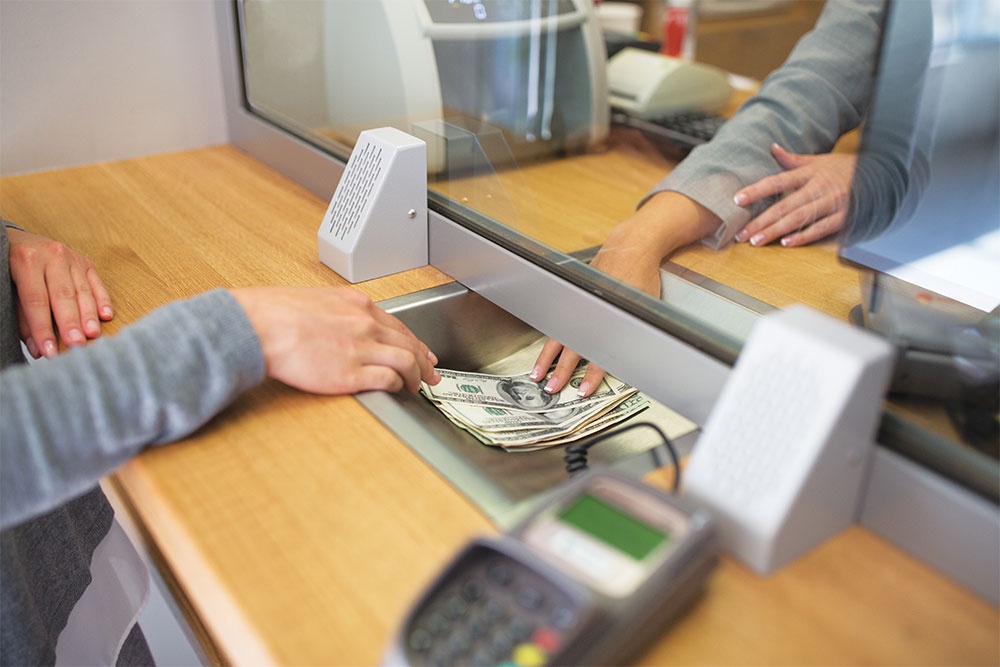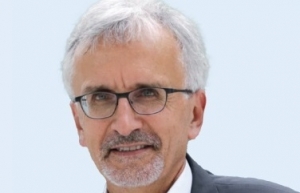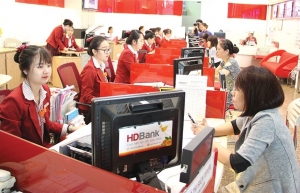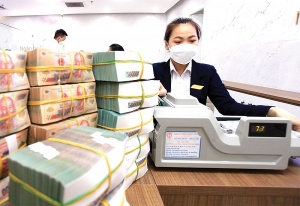Favourable balance declared in foreign currency
The rate in the first quarter was volatile, recording a strong increase of about 1.8 per cent in the period after the Lunar New Year before falling back to 23,450 VND/USD at seen at the beginning of the year.
 |
| Favourable balance declared in foreign currency, illustration photo Le Toan |
In the international market, the USD has become less attractive. Although good economic data in the first two months of the year brought the US Dollar Index up nearly 2 per cent to 105-106, the turning point came with uncertainties in the banking sector, causing the index to drop to around 101-102.
According to Bui Hai Duong, sales director at HSBC Vietnam, the trend of the Dollar Index is the main factor affecting the foreign exchange market in Vietnam. The index, after peaking in early March, has returned to a bearish trend as the world market expects the Fed to soon end the hike cycle.
“US inflation continuing to cool and the negative effects of tight monetary policy are both factors that lead to market expectations on USD interest rates. The USD/VND exchange rate also follows the downward trend of the USD in the world market, falling to the State Bank of Vietnam’s (SBV) buying price range of 23,450 VND/USD after hitting a peak of 23,900 in March,” Duong said.
According to a leader at BIDV, the balance of supply and demand of foreign currency has become favourable, with an estimated surplus of about $4-5 billion. This is remarkable in the context of the overall balance of payments having a huge deficit in 2022, at approximately $23 billion.
Some components have significantly improved compared to the previous year, such as a trade balance of goods with a surplus of about $4 billion, and import and export of services with a small deficit of $210 million compared to $4 billion last year.
“On the other hand, the demand for foreign currency for futures and hoarding activities also decreased, in the context of the international USD cooling. All in all, the most difficult period for rates may have passed. It is forecast that in the second quarter, the interbank USD/VND exchange rate will be stable,” the BIDV leader said.
Duong of HSBC forecast that the Dollar Index will continue its downward trend in the global market, with the main driving factor being the expectation that the USD interest rate will soon peak. Meanwhile, a factor that could increase the value of the USD comes from the need to hold it as a safe asset amid fear of a crisis in the US banking system.
“However, according to analysis, this risk is not high thanks to the timely intervention of the Fed and the US Department of Finance to stabilise the financial market. The VND is also receiving support from basic factors in the domestic market,” Duong said.
According to Duong, Vietnam’s balance of payments is improving. Data for the first quarter of 2023 shows that the supply of foreign currency is stable from the trade surplus at $4 billion, foreign investment disbursement reached $4.3 billion, and there has been a strong return of foreign capital into the capital market.
Meanwhile, the service balance deficit narrowed to only $216 million in the first quarter of 2023, which was a great improvement as compared to the first quarter of 2022 and the fourth quarter of 2022, respectively $1 billion and $3.9 billion. The improvement of the service balance was largely due to a strong recovery in foreign tourists.
“Another factor is the corporate bond market crisis, which had a negative impact on market sentiment in 2022. After measures from the government, the corporate bond market has contributed to stabilising market sentiment since the beginning of 2023,” Duong said.
“From these factors, the VND is forecasted to have positive fluctuations in the second quarter of 2023. The SBV is expected to maintain the policy of market intervention by buying foreign currencies to increase national foreign exchange reserves,”
In the international market, the strength of the USD is likely to continue to be limited, as the Fed gradually reaches the end of the monetary tightening process.
“Firstly, the health of banks has been significantly improved thanks to new standards and regulations to ensure safety and compliance. Secondly, the Fed and major central banks have experienced the lessons of 2008 and have reacted rapidly. I think the Dollar Index will fluctuate mainly around 99-102 in the second quarter of 2023,” the BIDV leader said.
From the domestic perspective, he suggested the balance of supply and demand of foreign currency was not expected to be abundant in the second quarter, and estimated to be balanced. Some basic capital flows such as the balance of trade in goods and disbursement of foreign direct investment are expected to be negative, due to a difficult global economy.
However, the arising foreign currency demand is not expected to be large due to favourable trends in the international environment. If some large-scale potential capital sales are made, the supply and demand for foreign currency may shift back to surplus.
Duong of HSBC added that the decline in global trade affected both sides of Vietnam’s trade.Foreign funding disbursement showed a slight decrease of 2.2 per cent on last year. Meanwhile, the foreign currency supply is supplemented by the return of foreign tourists and indirect investment inflows.
“Thanks to the positive factors that are supporting the VND, the market’s confidence has been improved, so the SBV’s decision to lower interest rates did not have a negative impact on the exchange rate,” he said.
The SBV’s move to lower interest rates is aimed at supporting the struggling economy. In particular, the decision to lower interest rates will help businesses operating in the commercial production sector to reduce financial costs and stabilise business in the context of a weakening global economy, Duong concluded.
 | New exchange rate policy not without risk Exchange rate volatility is increasing due to geopolitical shocks across the globe. Thanks to its sound policy framework, Vietnam has remained largely immune to such international turbulence. However, exchange-rate depreciation is not without risks, writes Patrick Lenain, senior associate at the Council on Economic Policies. |
 | Flexibility headlines finance for 2022 Interest rates, exchange rates, and credit growth were the focus of a volatile 2022, and more complexities are forecast for the following 12 months. |
 | Exchange rate spike not deemed an imminent threat The USD exchange rate on the morning of February 24 on the free market and banks both increased sharply compared to the previous session, exceeding the threshold of VND24,000. |
What the stars mean:
★ Poor ★ ★ Promising ★★★ Good ★★★★ Very good ★★★★★ Exceptional
Related Contents
Latest News
More News
- Private capital funds as cornerstone of IFC plans (February 20, 2026 | 14:38)
- Priorities for building credibility and momentum within Vietnamese IFCs (February 20, 2026 | 14:29)
- How Hong Kong can bridge critical financial centre gaps (February 20, 2026 | 14:22)
- All global experiences useful for Vietnam’s international financial hub (February 20, 2026 | 14:16)
- Raised ties reaffirm strategic trust (February 20, 2026 | 14:06)
- Sustained growth can translate into income gains (February 19, 2026 | 18:55)
- The vision to maintain a stable monetary policy (February 19, 2026 | 08:50)
- Banking sector faces data governance hurdles in AI transition (February 19, 2026 | 08:00)
- AI leading to shift in banking roles (February 18, 2026 | 19:54)
- Digital banking enters season of transformation (February 16, 2026 | 09:00)

 Tag:
Tag:



















 Mobile Version
Mobile Version